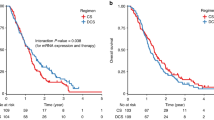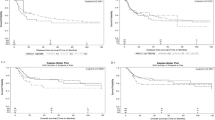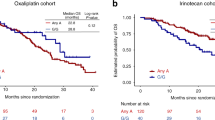Abstract
Epidermal growth factor receptor (EGFR) activation by radiation leads to increased cell proliferation and acts as a radioresistance mechanism. Neoadjuvant chemoradiation is the standard of care for locally advanced rectal cancer, and to date, no biomarkers of response have been found. We analyzed polymorphisms in the EGFR and its ligands, DNA repair genes and the thymidylate synthase in 84 stages II and III rectal cancer patients treated with neoadjuvant capecitabine plus radiotherapy. The rs11942466 polymorphism in the amphiregulin (AREG) gene region was associated with a pathological complete response (ypCR) (odds ratio: 0.26; 95% confidence interval: 0.06–0.79; P=0.014). The rs11615 C>T polymorphism in the ERCC1 gene also correlated with the ypCR as no patients with a C/C genotype achieved ypCR; P=0.023. This is the first work to propose variants within the AREG and the ERCC1 genes as promising predictive biomarkers of ypCR in rectal cancer.
This is a preview of subscription content, access via your institution
Access options
Subscribe to this journal
Receive 6 print issues and online access
$259.00 per year
only $43.17 per issue
Buy this article
- Purchase on Springer Link
- Instant access to full article PDF
Prices may be subject to local taxes which are calculated during checkout

Similar content being viewed by others
References
Sauer R, Becker H, Hohenberger W, Rodel C, Wittekind C, Fietkau R et al. Preoperative versus postoperative chemoradiotherapy for rectal cancer. N Engl J Med 2004; 351: 1731–1740.
Belluco C, De Paoli A, Canzonieri V, Sigon R, Fornasarig M, Buonadonna A et al. Long-term outcome of patients with complete pathologic response after neoadjuvant chemoradiation for cT3 rectal cancer: implications for local excision surgical strategies. Ann Surg Oncol 2011; 18: 3686–3693.
Hofheinz RD, Wenz F, Post S, Matzdorff A, Laechelt S, Hartmann JT et al. Chemoradiotherapy with capecitabine versus fluorouracil for locally advanced rectal cancer: a randomised, multicentre, non-inferiority, phase 3 trial. Lancet Oncol 2012; 13: 579–588.
Longley DB, Harkin DP, Johnston PG . 5-fluorouracil: mechanisms of action and clinical strategies. Nat Rev Cancer 2003; 3: 330–338.
Mandola MV, Stoehlmacher J, Muller-Weeks S, Cesarone G, Yu MC, Lenz HJ et al. A novel single nucleotide polymorphism within the 5' tandem repeat polymorphism of the thymidylate synthase gene abolishes USF-1 binding and alters transcriptional activity. Cancer Res 2003; 63: 2898–2904.
Kawakami K, Omura K, Kanehira E, Watanabe Y . Polymorphic tandem repeats in the thymidylate synthase gene is associated with its protein expression in human gastrointestinal cancers. Anticancer Res 1999; 19: 3249–3252.
Lamas MJ, Duran G, Gomez A, Balboa E, Anido U, Bernardez B et al. X-ray cross-complementing group 1 and thymidylate synthase polymorphisms might predict response to chemoradiotherapy in rectal cancer patients. Int J Radiat Oncol Biol Phys 2012; 82: 138–144.
Villafranca E, Okruzhnov Y, Dominguez MA, Garcia-Foncillas J, Azinovic I, Martinez E et al. Polymorphisms of the repeated sequences in the enhancer region of the thymidylate synthase gene promoter may predict downstaging after preoperative chemoradiation in rectal cancer. J Clin Oncol 2001; 19: 1779–1786.
Paez D, Salazar J, Pare L, Pertriz L, Targarona E, del Rio E et al. Pharmacogenetic study in rectal cancer patients treated with preoperative chemoradiotherapy: polymorphisms in thymidylate synthase, epidermal growth factor receptor, GSTP1, and DNA repair genes. Int J Radiat Oncol Biol Phys 2011; 81: 1319–1327.
Akimoto T, Hunter NR, Buchmiller L, Mason K, Ang KK, Milas L . Inverse relationship between epidermal growth factor receptor expression and radiocurability of murine carcinomas. Clin Cancer Res 1999; 5: 2884–2890.
Clancy C, Burke JP, Coffey JC . KRAS mutation does not predict the efficacy of neo-adjuvant chemoradiotherapy in rectal cancer: a systematic review and meta-analysis. Surg Oncol 2013; 22: 105–111.
Liu W, Innocenti F, Wu MH, Desai AA, Dolan ME, Cook EH Jr. et al. A functional common polymorphism in a Sp1 recognition site of the epidermal growth factor receptor gene promoter. Cancer Res 2005; 65: 46–53.
Spindler KL, Nielsen JN, Lindebjerg J, Jakobsen A . Germline polymorphisms may act as predictors of response to preoperative chemoradiation in locally advanced T3 rectal tumors. Dis Colon Rectum 2007; 50: 1363–1369.
Moriai T, Kobrin MS, Hope C, Speck L, Korc M . A variant epidermal growth factor receptor exhibits altered type alpha transforming growth factor binding and transmembrane signaling. Proc Natl Acad Sci USA 1994; 91: 10217–10221.
Hsieh YY, Tzeng CH, Chen MH, Chen PM, Wang WS . Epidermal growth factor receptor R521K polymorphism shows favorable outcomes in KRAS wild-type colorectal cancer patients treated with cetuximab-based chemotherapy. Cancer Sci 2012; 103: 791–796.
Hu-Lieskovan S, Vallbohmer D, Zhang W, Yang D, Pohl A, Labonte MJ et al. EGF61 polymorphism predicts complete pathologic response to cetuximab-based chemoradiation independent of KRAS status in locally advanced rectal cancer patients. Clin Cancer Res 2011; 17: 5161–5169.
Shahbazi M, Pravica V, Nasreen N, Fakhoury H, Fryer AA, Strange RC et al. Association between functional polymorphism in EGF gene and malignant melanoma. Lancet 2002; 359: 397–401.
Mandard AM, Dalibard F, Mandard JC, Marnay J, Henry-Amar M, Petiot JF et al. Pathologic assessment of tumor regression after preoperative chemoradiotherapy of esophageal carcinoma. Clinicopathologic correlations. Cancer 1994; 73: 2680–2686.
Gregory Warnes, with contributions from Gregor Gorjanc, Friedrich Leisch and Michael Man. Population Genetics 2012.
Akaike H . A new look at the statistical model identification. IEEE Trans Automat Contr 1974; AC 19: 716–723.
Dudbridge F, Koeleman BP . Rank truncated product of P-values, with application to genomewide association scans. Genet Epidemiol 2003; 25: 360–366.
Hothorn T, Hornik K, Zeileis A . Unbiased recursive partitioning: a conditional inference framework. J Comput Graph Stat 2006; 15: 651–674.
Kriegs M, Kasten-Pisula U, Rieckmann T, Holst K, Saker J, Dahm-Daphi J et al. The epidermal growth factor receptor modulates DNA double-strand break repair by regulating non-homologous end-joining. DNA Repair (Amst) 2010; 9: 889–897.
Dent P, Reardon DB, Park JS, Bowers G, Logsdon C, Valerie K et al. Radiation-induced release of transforming growth factor alpha activates the epidermal growth factor receptor and mitogen-activated protein kinase pathway in carcinoma cells, leading to increased proliferation and protection from radiation-induced cell death. Mol Biol Cell 1999; 10: 2493–2506.
Contessa JN, Hampton J, Lammering G, Mikkelsen RB, Dent P, Valerie K et al. Ionizing radiation activates Erb-B receptor dependent Akt and p70 S6 kinase signaling in carcinoma cells. Oncogene 2002; 21: 4032–4041.
Jedlinski A, Ansell A, Johansson AC, Roberg K . EGFR status and EGFR ligand expression influence the treatment response of head and neck cancer cell lines. J Oral Pathol Med 2013; 42: 26–36.
Jacobs B, De Roock W, Piessevaux H, Van Oirbeek R, Biesmans B, De Schutter J et al. Amphiregulin and epiregulin mRNA expression in primary tumors predicts outcome in metastatic colorectal cancer treated with cetuximab. J Clin Oncol 2009; 27: 5068–5074.
Sebio A, Paez D, Salazar J, Berenguer-Llergo A, Pare-Brunet L, Lasa A et al. Intergenic polymorphisms in the amphiregulin gene region as biomarkers in metastatic colorectal cancer patients treated with anti-EGFR plus irinotecan. Pharmacogenomics J 2013; 14: 256–262.
The ENCODE project consortium. An integrated encyclopedia of DNA elements in the human genome. Nature 2012; 489: 57–74.
Sawada N, Ishikawa T, Sekiguchi F, Tanaka Y, Ishitsuka H . X-ray irradiation induces thymidine phosphorylase and enhances the efficacy of capecitabine (Xeloda) in human cancer xenografts. Clin Cancer Res 1999; 5: 2948–2953.
Chen P, Wiencke J, Aldape K, Kesler-Diaz A, Miike R, Kelsey K et al. Association of an ERCC1 polymorphism with adult-onset glioma. Cancer Epidemiol Biomarkers Prev 2000; 9: 843–847.
Duell EJ, Wiencke JK, Cheng TJ, Varkonyi A, Zuo ZF, Ashok TD et al. Polymorphisms in the DNA repair genes XRCC1 and ERCC2 and biomarkers of DNA damage in human blood mononuclear cells. Carcinogenesis 2000; 21: 965–971.
Rzeszowska-Wolny J, Polanska J, Pietrowska M, Palyvoda O, Jaworska J, Butkiewicz D et al. Influence of polymorphisms in DNA repair genes XPD, XRCC1 and MGMT on DNA damage induced by gamma radiation and its repair in lymphocytes in vitro. Radiat Res 2005; 164: 132–140.
Cornetta T, Festa F, Testa A, Cozzi R . DNA damage repair and genetic polymorphisms: assessment of individual sensitivity and repair capacity. Int J Radiat Oncol Biol Phys 2006; 66: 537–545.
Acknowledgements
This work was supported by the Instituto de Salud Carlos III (FIS/1101711, CM11/00102 to Ana Sebio). We thank Carolyn Newey for language editing.
Author information
Authors and Affiliations
Corresponding author
Ethics declarations
Competing interests
The authors declare no conflict of interest.
PowerPoint slides
Rights and permissions
About this article
Cite this article
Sebio, A., Salazar, J., Páez, D. et al. EGFR ligands and DNA repair genes: genomic predictors of complete response after capecitabine-based chemoradiotherapy in locally advanced rectal cancer. Pharmacogenomics J 15, 77–83 (2015). https://doi.org/10.1038/tpj.2014.33
Received:
Revised:
Accepted:
Published:
Issue Date:
DOI: https://doi.org/10.1038/tpj.2014.33
This article is cited by
-
Association of thymidylate synthase polymorphisms with the tumor response to preoperative chemoradiotherapy in rectal cancer: a systematic review and meta-analysis
The Pharmacogenomics Journal (2017)
-
Effects of gene polymorphisms in the endoplasmic reticulum stress pathway on clinical outcomes of chemoradiotherapy in Chinese patients with nasopharyngeal carcinoma
Acta Pharmacologica Sinica (2017)
-
Germline and somatic genetic predictors of pathological response in neoadjuvant settings of rectal and esophageal cancers: systematic review and meta-analysis
The Pharmacogenomics Journal (2016)



